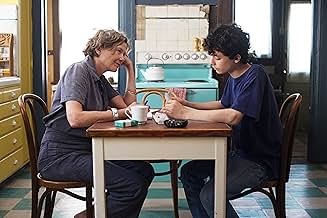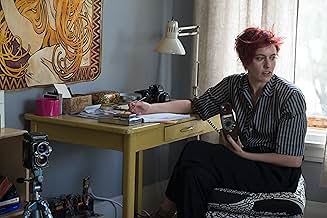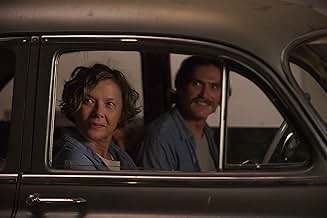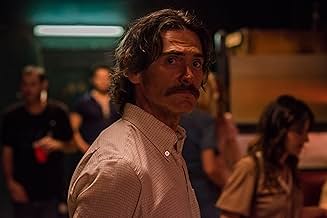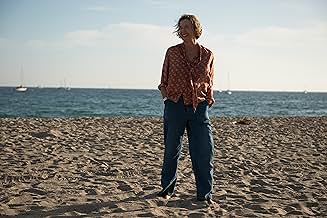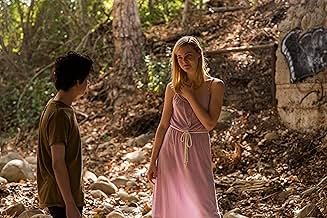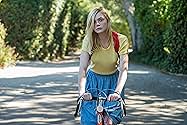20th Century Women
- 2016
- Tous publics
- 1h 59min
NOTE IMDb
7,3/10
52 k
MA NOTE
L'histoire d'un adolescent, de sa mère et de deux autres femmes qui aident à l'élever dans une atmosphère d'amour et de liberté en Californie du Sud en 1979.L'histoire d'un adolescent, de sa mère et de deux autres femmes qui aident à l'élever dans une atmosphère d'amour et de liberté en Californie du Sud en 1979.L'histoire d'un adolescent, de sa mère et de deux autres femmes qui aident à l'élever dans une atmosphère d'amour et de liberté en Californie du Sud en 1979.
- Réalisation
- Scénario
- Casting principal
- Nommé pour 1 Oscar
- 15 victoires et 82 nominations au total
Vitaly Andrew LeBeau
- Young Jamie Fields
- (as Vitaly A. Lebeau)
Avis à la une
This is a very strong film, unless you only like fast-paced action films; I'm going to go out on a limb and say you'll probably like this movie.
As is the norm with A24... it's a good film.
I don't really have much to complain about. I belied in the world of the film, I believed the characters were real, etc-- the world and logic of the film was well established. There were a few tropes of the genre, but some strong writing and direction makes one look past this without really thinking about it. I actually cared about the story and wanted to see how things played out.
The story is a bit disjointed, but I think that works to the film's benefit due to the type of storytelling it's going for, which overall is very effective.
I'd recommend this film to pretty much everyone that likes good movies.
8 out of 10
As is the norm with A24... it's a good film.
I don't really have much to complain about. I belied in the world of the film, I believed the characters were real, etc-- the world and logic of the film was well established. There were a few tropes of the genre, but some strong writing and direction makes one look past this without really thinking about it. I actually cared about the story and wanted to see how things played out.
The story is a bit disjointed, but I think that works to the film's benefit due to the type of storytelling it's going for, which overall is very effective.
I'd recommend this film to pretty much everyone that likes good movies.
8 out of 10
9Lele
I understand the rage of many other US reviewers because this movie is so far from usual Hollywood clichés that it does not even look like an US movie! It seems an European movie. Bergman, Fellini and stuff...
It is NOT boring. It has its pace and it is exacly what it has to be.
I identified myself at different levels. I was born in 1958, just like the main actress (great performance). And like Dorothea I had a daugther when I was in my 40s (she now is 15, like Jamie, Dorothea's son) and I don't know how to talk to her, I don't like much of the music she likes and so on.
I was a teenager in the 70s, so I identified with Jamie, great character: I wish I had one thousandth of his self-consciousness when I was his age!
This movie was oxygen for suffocating US major's movies, after sequels and remakes and CGI shows finally something to think about.
This movie was oxygen for suffocating US major's movies, after sequels and remakes and CGI shows finally something to think about.
The scene feels remarkably familiar – Dorothea (Bening), the matron and saint of a Santa Barbara household circa 1979 leans in on her son Jamie (Zumann) listening to "Fairytale in the Supermarket" by The Raincoats. "They know they sound terrible right?" she says. Abbie (Gerwig), Dorothea's avant-garde lodger interjects; "yeah, but it's like they don't care. They got all this feeling but don't have the tools they need to express it
it all comes out as passion." Dorothea fixates on Abbie's intonation, like listening to language she's only now grasping. She gets it...but then she doesn't.
Much like Abbie's defense of The Raincoats, Dorothea believes she has all the passion to be a proper mother, but she lacks the right tools to support a son who is growing older with each passing moment. She decides to enlist the help of two young women; Julie, Jamie's best friend and crush and Abbie a free spirit who was recently treated for cervical cancer. The only other man in the picture is William (Crudup) a well-meaning former hippie with a gift for mechanics and a passion for pottery. Between them all, the stalwart Dorothea hopes to quietly guide her son through his formative years which pit her depression era approach, to Jamie's recession era resentments. "Don't you need a man to raise another man?" asks Julie. "No I don't think you do." 20th Century Women starts with competing voice-overs and uses a collage approach to convey the surfaces of each character's inner life. The collages are stuffed to the brim with stills of 1930's gloom and 1960's turbulence all set to audio of proto-punk, Jimmy Carter's Malaise Speech and "As Life Goes By" from Casablanca (1942). It's an awkward mix; one that creates an echo chamber of sorts.
That subtle discordance of people talking at and not to each other, runs through the first half of the film. Jamie's coming-of-age story, a volatile mix of stubborn familial resentment and unrequited love clobbers together with Dorothea's own midlife crisis. "I had Jamie when I was 40." Dorothea says; a fact that can help explain Dorothea's free-range parenting approach, but also helps explain why Jamie's sharp insights cut so deep. For a while there it always seems like its Jamie versus Dorothea, pulled apart by an ever widening generational gap.
Then, like responding to the blessing of a wartime parlay, the factions in this film begin to center and calm. It is during this truce that the film begins to really take off, presenting its characters with vibrancy and humanity while flying through a more nuanced story arc. Almost independently both Jamie and Dorothea learn their goals are one in the same and the differences they have are little compared to their mutual respect for time which presents itself in rainbow tinged tracking shots and subtle fast-forwards.
And at the center of 20th Century Women lies the affable Annette Bening who suitably captures the zeitgeist of a generation no longer with us. While most might pigeonhole Dorothea as a madcap eccentric or worse a passive pushover, Bening wisely lets the character's inner strength shine through. Dorothea is unabashedly a one of a kind lady. She invites strangers to dinner, invites herself to punk clubs, leaves early, and then comes back days later alone. She verves uncomfortably with post-sexual revolution mores yet she quietly takes frank conversations about menstruation in stride. She does all this because she knows that with every encounter, every meeting, every stranger there's a chance for exchange.
Of course 20th Century Women is not without its problems. While Bening, Gerwig and Fanning all do wonders in their roles, Zumann fails to endear the young Jamie to the audience in any meaningful way. Part of it is due to the part as it is written. The film is loosely based on the life of director Mike Mills thus Jamie at times feels more like an avatar than a real teenager. Additionally it's ironic that despite constant paraphrasing of feminist literature, 20th Century Women would struggle to pass the Bechdel Test. Our three women characters orbit Jamie's life and analyze his actions and motives like he's the center of their universe.
Yet, while the film uses the wider Women's Liberation movement as window dressing, allowing the external conflicts of the film to melt away to reveal honest internal pain was a stroke of genius. Genius enough to maybe be interpreted as a meta-text on standard storytelling practices being a form of patriarchal oppression. That however is a discussion for another day. 20th Century Women is an artfully rendered film with plenty to say about the passage of time, the commonality between the generation gaps and the unifying love of mother and son.
Much like Abbie's defense of The Raincoats, Dorothea believes she has all the passion to be a proper mother, but she lacks the right tools to support a son who is growing older with each passing moment. She decides to enlist the help of two young women; Julie, Jamie's best friend and crush and Abbie a free spirit who was recently treated for cervical cancer. The only other man in the picture is William (Crudup) a well-meaning former hippie with a gift for mechanics and a passion for pottery. Between them all, the stalwart Dorothea hopes to quietly guide her son through his formative years which pit her depression era approach, to Jamie's recession era resentments. "Don't you need a man to raise another man?" asks Julie. "No I don't think you do." 20th Century Women starts with competing voice-overs and uses a collage approach to convey the surfaces of each character's inner life. The collages are stuffed to the brim with stills of 1930's gloom and 1960's turbulence all set to audio of proto-punk, Jimmy Carter's Malaise Speech and "As Life Goes By" from Casablanca (1942). It's an awkward mix; one that creates an echo chamber of sorts.
That subtle discordance of people talking at and not to each other, runs through the first half of the film. Jamie's coming-of-age story, a volatile mix of stubborn familial resentment and unrequited love clobbers together with Dorothea's own midlife crisis. "I had Jamie when I was 40." Dorothea says; a fact that can help explain Dorothea's free-range parenting approach, but also helps explain why Jamie's sharp insights cut so deep. For a while there it always seems like its Jamie versus Dorothea, pulled apart by an ever widening generational gap.
Then, like responding to the blessing of a wartime parlay, the factions in this film begin to center and calm. It is during this truce that the film begins to really take off, presenting its characters with vibrancy and humanity while flying through a more nuanced story arc. Almost independently both Jamie and Dorothea learn their goals are one in the same and the differences they have are little compared to their mutual respect for time which presents itself in rainbow tinged tracking shots and subtle fast-forwards.
And at the center of 20th Century Women lies the affable Annette Bening who suitably captures the zeitgeist of a generation no longer with us. While most might pigeonhole Dorothea as a madcap eccentric or worse a passive pushover, Bening wisely lets the character's inner strength shine through. Dorothea is unabashedly a one of a kind lady. She invites strangers to dinner, invites herself to punk clubs, leaves early, and then comes back days later alone. She verves uncomfortably with post-sexual revolution mores yet she quietly takes frank conversations about menstruation in stride. She does all this because she knows that with every encounter, every meeting, every stranger there's a chance for exchange.
Of course 20th Century Women is not without its problems. While Bening, Gerwig and Fanning all do wonders in their roles, Zumann fails to endear the young Jamie to the audience in any meaningful way. Part of it is due to the part as it is written. The film is loosely based on the life of director Mike Mills thus Jamie at times feels more like an avatar than a real teenager. Additionally it's ironic that despite constant paraphrasing of feminist literature, 20th Century Women would struggle to pass the Bechdel Test. Our three women characters orbit Jamie's life and analyze his actions and motives like he's the center of their universe.
Yet, while the film uses the wider Women's Liberation movement as window dressing, allowing the external conflicts of the film to melt away to reveal honest internal pain was a stroke of genius. Genius enough to maybe be interpreted as a meta-text on standard storytelling practices being a form of patriarchal oppression. That however is a discussion for another day. 20th Century Women is an artfully rendered film with plenty to say about the passage of time, the commonality between the generation gaps and the unifying love of mother and son.
Just like the central character in this film, I was born in 1964. Just like him, I was 15 in 1979. My mother was only two years older than his mother. So, you'd think I could relate to this film. But I couldn't, really.
Maybe that is because I didn't grow up in a bohemian single parent household in Santa Barbara. Life for 15 year old Jamie was different than it was from me. I had two parents, but I didn't have a skateboard.
Yes, I can remember Jimmy Carter being president. But I didn't see his impressive and remarkably modern 'Crisis of Confidence'-speech, which is an important feature in one of the scenes of this film. There's only one thing which caused somewhat nostalgic emotions: making mix tapes. Yes, I did that too.
'20th Century Women', which is essentially about a mother raising a son, has nice scenes. I really liked the explanation about punk rock music to the 55 year old mother: she complains about the lack of beauty, but exactly that is the strength of it. There are many such scenes, with small but meaningful events, telling a lot about how life was in the seventies.
But the story itself didn't captivate me. Jamie's mother thinks she can't raise Jamie on her own, so she involves his best friend (a girl) and a photographer who rents a room in the house (also a girl). They teach him lots of things about sex, music, seducing women, and life in general. All characters are in a way in search of there own destiny. So, a lot of soul searching is going on. Anyway, the film contains one of the best one-liners I've heard in years: 'Wondering if you're happy is a great shortcut to just being depressed'.
Maybe that is because I didn't grow up in a bohemian single parent household in Santa Barbara. Life for 15 year old Jamie was different than it was from me. I had two parents, but I didn't have a skateboard.
Yes, I can remember Jimmy Carter being president. But I didn't see his impressive and remarkably modern 'Crisis of Confidence'-speech, which is an important feature in one of the scenes of this film. There's only one thing which caused somewhat nostalgic emotions: making mix tapes. Yes, I did that too.
'20th Century Women', which is essentially about a mother raising a son, has nice scenes. I really liked the explanation about punk rock music to the 55 year old mother: she complains about the lack of beauty, but exactly that is the strength of it. There are many such scenes, with small but meaningful events, telling a lot about how life was in the seventies.
But the story itself didn't captivate me. Jamie's mother thinks she can't raise Jamie on her own, so she involves his best friend (a girl) and a photographer who rents a room in the house (also a girl). They teach him lots of things about sex, music, seducing women, and life in general. All characters are in a way in search of there own destiny. So, a lot of soul searching is going on. Anyway, the film contains one of the best one-liners I've heard in years: 'Wondering if you're happy is a great shortcut to just being depressed'.
The status of "too personal" could be its basic virtue. and its sin. because it represents a chronicle. about "80 decade, about family life in large sense, about sexual education and motherhood. and, sure, about freedom. in same measure, it is a film with precise target. remembering independent films, near to every day details too much, it is the film who could be an experience, usuful in profound sense, or just waste of time. but, out of that too easy definitions, it is an admirable work. for script, performances - the kind of film in which each actor seems be the only wise choice for his character - but, first, for Annette Bening who does a magnificent job as middle age mother, in war against her past, insecure about future, without courage to become herself, appentice of her son, discovering the essence of life next her friends. a great film. really !
Le saviez-vous
- AnecdotesDuring rehearsals, the cast was encouraged to bring in music they believed their characters listened to. Then, to encourage familiarity among the cast, there would be a dance party where the only rule was that everyone had to dance and it didn't matter what the song was.
- GaffesDorothea is variously depicted discussing her stock portfolio with her son Jamie, quoting NYSE share prices in decimals, doing this in 1979. However, the switch to decimal from fractional stock prices in the U.S. did not occur until the year 2000.
- ConnexionsFeatured in WatchMojo: Top 10 Movies of 2016 Already Getting Oscar Buzz (2016)
- Bandes originalesDon't Worry About the Government
Written by David Byrne
Performed by Talking Heads
Courtesy of Sire Records
By arrangement with Warner Music Group Film & TV Licensing
Meilleurs choix
Connectez-vous pour évaluer et suivre la liste de favoris afin de recevoir des recommandations personnalisées
- How long is 20th Century Women?Alimenté par Alexa
Détails
- Date de sortie
- Pays d’origine
- Sites officiels
- Langue
- Aussi connu sous le nom de
- Mujeres del siglo XX
- Lieux de tournage
- East Beach, Santa Barbara, Californie, États-Unis(Santa Barbara, CA)
- Sociétés de production
- Voir plus de crédits d'entreprise sur IMDbPro
Box-office
- Budget
- 7 000 000 $US (estimé)
- Montant brut aux États-Unis et au Canada
- 5 664 764 $US
- Week-end de sortie aux États-Unis et au Canada
- 111 200 $US
- 1 janv. 2017
- Montant brut mondial
- 7 214 806 $US
- Durée
- 1h 59min(119 min)
- Couleur
- Mixage
- Rapport de forme
- 2.00 : 1
Contribuer à cette page
Suggérer une modification ou ajouter du contenu manquant







